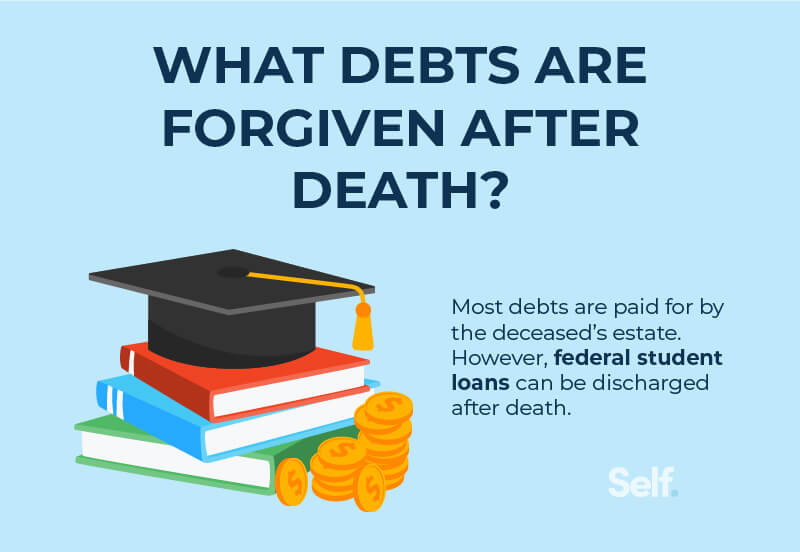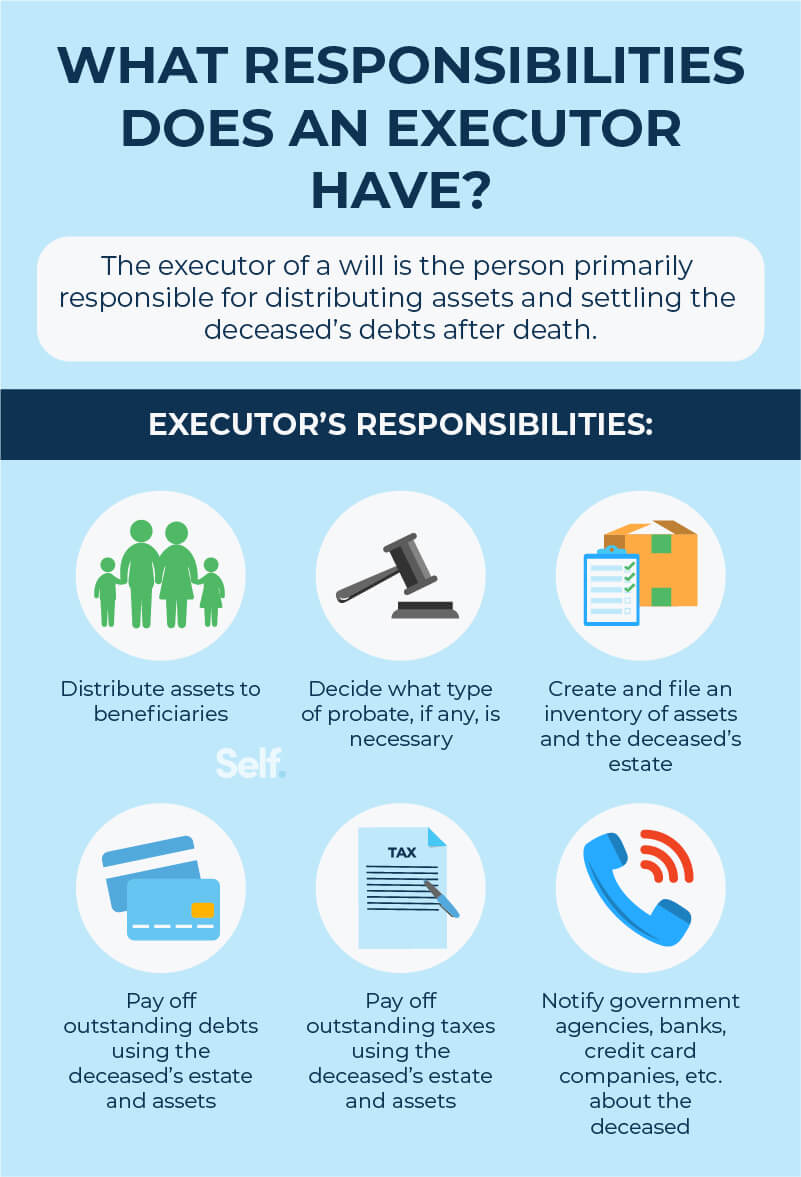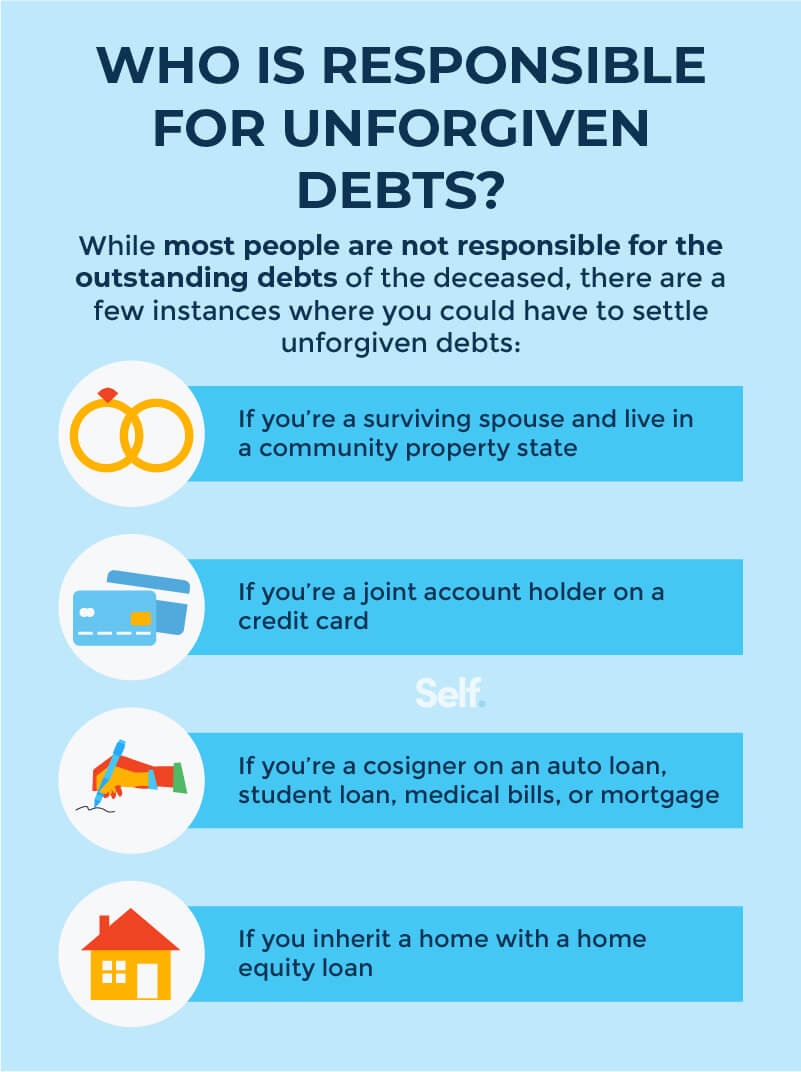What Debts Are Forgiven at Death?
Published on: 09/29/2021
Two things many people don't like to spend time thinking about are debt and death. Although a few types of debt can be forgiven after death, most of the time, the beneficiary has to handle outstanding debts after a loved one's passing.
Generally speaking, federal student loan debt is the only type of debt that dies with you. In some cases, private student loan debt can be discharged after death if the lender agrees and the deceased's name was the only one on the loan. Unfortunately, most outstanding debt must still be paid out after death.[1]
It’s just a matter of who pays and how.

What happens to debt when you die?
Most debt does not go away when a person dies; it remains that person’s sole responsibility — so it becomes the responsibility of the deceased person’s estate. Debts are traditionally paid off by liquidating assets or using money from savings accounts, life insurance policies, death benefits, or the person’s estate.
The deceased person’s legal heirs may be affected by this process because debts must be paid off before heirs receive their inheritance. However, in most cases, the heirs won't have to pay off those debts out of their own pockets.
There are a few exceptions, the most notable and common one involving a cosigned loan. For example, if you've cosigned a car loan or student loan, you would still be responsible for making payments after the primary loan holder's death.
You also may be responsible for debt incurred by a deceased party if you were married to that person and live in a community property state. In that case, you’ll be considered jointly responsible for any debts incurred during the marriage (but not before). Community property states are Arizona, California, Idaho, Louisiana, Nevada, New Mexico, Texas, Washington, and Wisconsin.[2]
However, suppose you are married and live in a common-law state. In that case, any property each individual accumulates during the marriage is viewed as separate property.
Other cases in which you may be responsible are if you are a surviving spouse who lives in a state that requires you to pay some types of debt (such as medical expenses), or if you failed to follow state probate laws as the person legally responsible for resolving the estate.[3]
Private student loans
When it comes to private student loans, what happens when you die can vary. Each lender has its own agreements, so read the fine print before you sign.
Some companies that offer private student loans are willing to discharge them in the event of the borrower’s death. They include Ascent, College Ave, Earnest, RISLA, Sallie Mae, and SoFi.[4]
In the case of cosigned loans, the implications may depend on which person dies. If the primary borrower passes away, the lender will likely relieve the cosigner of further responsibility to pay the student loan debt. However, if the cosigner dies, the recipient is still responsible for repaying the loan.[4]
Federal student loans
If you die, your federal student loans will be discharged. Before that can happen, though, your executor must submit the required proof of death to your loan servicer. Acceptable documents include the original death certificate or a certified copy of the death certificate, or a complete and accurate photocopy.[5]
Students also aren’t responsible for Parent PLUS loans that their parents take out. If the parent who took out the loan dies with the balance due, you won’t have to repay the loan. Also, if you pass away, the loan will be forgiven as well, and your parent won’t be under any further obligation.[6]
Auto loans
An auto loan is a form of secured loan, which means the vehicle acts as collateral for the lender to ensure that the loan is repaid. If you still owe money on your car when you die, the debt doesn't go away. If you leave your car to a relative in your will, that person will have to keep up with the payments to keep the car. If they don't, the bank can repossess the vehicle.
Alternatively, the heir could sell the car to pay off the loan and, if there’s money left over, pocket the difference.[7]
Medical bills
Medical bills generally don’t go away when you die. In community property states (see above), the debt falls typically to the surviving spouse to repay.
Medical providers have discretion over whether to attempt to collect an unpaid medical bill from your estate; they may not think a small amount is worth the effort, but a larger amount may be.[7]
In most states, medical bills fall relatively low on the priority list regarding who’s allowed to collect. In general, funeral expenses are the first thing that must be repaid from an estate, followed by the cost of administering the estate and unpaid taxes. Medical and hospital bills come after that.[8]
Credit card debt
Credit card debt is a form of unsecured debt: That is, you don't have to put up any collateral to "secure" your loan. Suppose you pass away with credit card debt on an account with a joint owner. In that case, that co-owner becomes responsible for any remaining balance and future interest. Authorized users are different: They won't need to repay the debt.
Credit card companies may try to collect the debt from the estate, but relatives are not responsible for paying it.[7]
Mortgage debt
A mortgage is another form of secured loan, like an auto loan, and it’s handled the same way in the event of death. If you die with a balance still due on your mortgage, whoever inherits the home will have to continue making mortgage payments if they want to keep the house. If no one makes those payments, the bank can foreclose on the property.
Personal loans
Personal loans can be obtained for various reasons. They may be offered by banks, credit unions, or lenders that operate online. For example, you might get a personal loan to pay for moving or medical expenses, to consolidate debt, or for home repairs or renovations.
These are unsecured loans, like credit card debt, and the lenders may file a claim against the estate, but they can’t collect from relatives.
What happens to debts if the deceased has no estate?
With some exceptions, family members aren't legally required to pay off a deceased relative's debt. Those exceptions vary by state and include:
- If you live in a community property state
- Are a cosigner on a loan
- Have other legal responsibilities, such as medical debt
The debt would be paid out using assets or money from someone's estate most of the time. However, if there's not enough money to cover the deceased person's debt, the next of kin would have little responsibility.

Who helps resolve the debt?
The executor is the person who is responsible for administering the estate of someone who has passed away by collecting the estate’s assets, paying off creditors, and distributing whatever’s left to heirs according to the expressed wishes of the deceased person.[9]
The executor may have to collect a variety of assets, including savings and checking account balances, stock investments, real estate, life insurance benefits, savings bonds, and so forth. The executor may decide to sell some assets to pay debts. Money owed to the United States government is the first priority.
It’s important to remember that debts come first, in general, before any beneficiaries can be paid. If the estate isn’t of sufficient value to cover the costs of all the claims made against it, no assets will be available for the beneficiaries.[10]
Specific responsibilities of the executor include applying for an employer identification number (EIN) for the estate, filing all final tax returns when they’re due, and paying those taxes until the executor’s duties are completed.[9]
The executor (or court-appointed administrator if no will exists) must obtain a taxpayer ID number from each beneficiary.

What debt are you responsible for in a community property state?
In community property states, the surviving spouse may be required to pay off outstanding debt using community property.
As mentioned above, community property states as of 2021 are Arizona, California, Idaho, Louisiana, Nevada, New Mexico, Texas, Washington, and Wisconsin. (Alaska has an optional community property system.)
These stand in contrast to common-law states, where property acquired during a marriage is considered the sole property of the person who acquired it unless it’s put explicitly in both spouses’ names.[11] That also means that if you live in a common-law state and aren’t obligated to repay your spouse’s debt with your own money, it won’t affect your credit score.[12]
Under community property law, spouses operate in what amounts to a partnership. Because each person contributes labor and material resources to benefit the partnership, each holds a 50% stake in that property, regardless of which spouse acquired it.[13]
Exceptions to this rule are prenuptial agreements, which generally take precedence, and property acquired before the marriage (before the partnership was formed).
Suppose your deceased spouse opened a credit account during your marriage, and there's debt owed on it. In that case, you're responsible for repaying it in a community property state.[14]
Why is probate important for settling debts after death?
Probate is the name for a court-supervised process that provides legal recognition of a deceased person’s will. It involves the formal appointment of an executor to account for the estate’s assets, pay creditors, and distribute assets to beneficiaries.[15]
Probate matters because it provides an orderly, legally recognized process for executing a will according to the decedent’s wishes while dealing with any claims against the estate.
Once the probate period begins, the executor files a public notice in the newspaper to notify creditors of their opportunity to file claims against the estate. Creditors then have a limited amount of time, depending on the state, to file a claim against the estate. If the executor rejects the claim, it can be challenged in court before a probate judge.[16]
Probate isn't typically used if the deceased debts are greater than their assets. In some states, probate may not be necessary for small estates.
Probate has a reputation for taking a long time, and the process tends to take between six months and a year, with the average being nine months.[17] State laws on probate vary, and some offer streamlined probate processes. However, lawsuits by heirs contesting a will, rather than the probate process itself, tend to be most responsible for delays.[15]
Some states, such as California, have a long and costly process, but it's less arduous in others, such as North Carolina. One thing to be careful of is the living trust. Though many salespeople have promoted these as alternatives to probate, some form of probate will probably still be needed. Furthermore, some living trust offers don't deliver on what they promise.[18]
If you want to avoid probate, there are strategies to use[19] , including:
- Opening multiple-party accounts with financial institutions
- Setting up joint tenancy agreements with rights of survivorship
- Placing Transfer on Death designations on securities
What happens during debt collection?
Debt collectors have the right to file a claim against a decedent’s estate just as any other creditor might.[12]
Debt collection is a process of attempting to collect an unpaid debt. A debt typically “goes to collections” after several months of nonpayment — which begins to affect your credit after 30 days.
Some companies employ their own debt collectors, while others “charge off” their debt, selling it to collection agencies, which then try to collect instead. At that point, you may start getting calls from companies seeking to collect from you. However, it's important to know that there are certain things they can't do under the Fair Debt Collection Practices Act (FDCPA).
The act, enforced by the Federal Trade Commission (FTC), limits when and how collection agents can call you and how they can treat you. For instance, they can’t contact you on the job if you tell them you’re not allowed to accept calls at work, and they can’t call you before 8 a.m. or after 9 p.m. without your consent.[20]
Collectors also can't threaten to hurt you or have you arrested, call you repeatedly, or use profanity when contacting you. In addition, they aren't allowed to falsely claim you owe more than you do or pretend to be someone they're not, such as a law enforcement officer or attorney.
In the case of someone’s passing, a collector can contact the person’s spouse in an attempt to locate the executor of the estate, but can’t represent that the spouse is responsible for the debt unless they’re legally obligated to repay it (for instance, if they are a joint account holder or cosigner of a loan).[12]
Debt collectors can also contact you as a spouse if you live in a community property state or if you’re the executor. If you’re not the executor, you might want to refer the collection agency to the person who is.
Suppose you have problems with a debt collector and believe they are violating the law. In that case, you can report them to your state attorney general, the Federal Trade Commission, and/or the Consumer Financial Protection Bureau. You can also sue them in court, but even if the debt collector violated the law, you might still be responsible for paying the debt itself.[20]
Can debt collectors contact me about a deceased person’s outstanding debt?
In addition to contacting a deceased person’s spouse under certain circumstances, debt collectors may also be within their rights to contact other relatives.
Similar rules apply to those mentioned concerning a spouse above. Debt collectors can contact you if you are a cosigner, joint account holder, or in some other way legally obligated for the deceased person’s debts. They can also contact you if you are the executor or administrator of the estate or to locate the executor.
If they’re trying to find the executor, they shouldn’t mention the debt to you or discuss it with you.
Again, you cannot be contacted repeatedly, at work, or overnight without your consent. You cannot be harassed, lied to, bullied, or threatened.[21]
The bottom line
Dealing with the debt of a deceased family member isn't an abstract issue. Nearly 75% of people die with outstanding debt, so you may have to deal with these issues.[22]
Whether you’re a beneficiary or an executor, it’s important to know who (if anyone) is responsible for a deceased person’s debts and how they should be resolved.
As outlined above, who is responsible depends on the kind of debt incurred, the obligations under the contract, and the law. Secured and unsecured debt are different; so are student loans. If you're a surviving spouse, it matters if you were married in a common-law or community property state.
Once you understand how these factors work and apply to you, you can more effectively sort through the debt of a loved one's estate.
Sources
- Consumer Financial Protection Bureau. “If someone dies owing a debt, does the debt go away when they die?” https://www.consumerfinance.gov/ask-cfpb/if-someone-dies-owing-a-debt-does-the-debt-go-away-when-they-die-en-1463/. Accessed August 20, 2021.
- Investopedia. “Community Property State,” https://www.investopedia.com/personal-finance/which-states-are-community-property-states/. Accessed August 20, 2021.
- Federal Trade Commission. “Debts and Deceased Relatives,” https://www.consumer.ftc.gov/articles/debts-and-deceased-relatives. Accessed August 20, 2021.
- Forbes. “What Happens to Student Loans When You Die?” https://www.forbes.com/advisor/student-loans/what-happens-to-student-loans-when-you-die/. Accessed August 20, 2021.
- Federal Student Aid. “If your loan servicer receives acceptable documentation of your death, your federal student loans will be discharged.” https://studentaid.gov/manage-loans/forgiveness-cancellation/death. Accessed August 20, 2021.
- CNBC. “73% of student loan borrowers don’t know what happens to their debt if they die,” https://www.cnbc.com/2019/12/17/majority-of-borrowers-dont-know-how-death-affects-student-loans.html. Accessed August 20, 2021.
- Forbes. “Here’s What Happens To Your Debts When You Die,” https://www.forbes.com/advisor/life-insurance/what-happens-to-debts-when-you-die/. Accessed August 20, 2021.
- CNBC. “Here’s how unpaid debt is handled when a person dies,” https://www.cnbc.com/2020/05/28/heres-how-unpaid-debts-are-handled-when-a-person-passes-away.html. Accessed August 20, 2021.
- Department of the Treasury, Internal Revenue Service. “Survivors, Executors, and Administrators,” https://www.irs.gov/pub/irs-pdf/p559.pdf. Accessed August 20, 2021.
- Commissioner of Accounts for the Circuit Court of Henrico County Virginia. “Duties of the Administrator or Executor,” http://www.henricocommissionerofaccounts.com/estate/duties. Accessed August 20, 2021.
- World Population Review. “Community Property States 2021,” https://worldpopulationreview.com/state-rankings/community-property-states. Accessed August 20, 2021.
- Consumer Financial Protection Bureau. “Can I be responsible to pay off the debts of my deceased spouse?” https://www.consumerfinance.gov/ask-cfpb/am-i-responsible-to-pay-off-the-debts-of-my-deceased-spouse-en-1467/. Accessed August 20, 2021.
- IRS. “Part 25. Special Topics,” https://www.irs.gov/irm/part25/irm_25-018-001. Accessed August 20, 2021.
- Experian. "How to Handle Credit and Debt After the Death of a Spouse," https://www.experian.com/blogs/ask-experian/credit-education/life-events/death-of-a-spouse/. Accessed August 31, 2021.
- ABA. “The Probate Process,” https://www.americanbar.org/groups/real_property_trust_estate/resources/estate_planning/the_probate_process/. Accessed August 20, 2021.
- Investopedia. "Notice to Creditors," https://www.investopedia.com/terms/n/notice-to-creditors.asp. Accessed August 31, 2021.
- Investopedia. “Probate Court Definition,” https://www.investopedia.com/terms/p/probate-court.asp. Accessed August 20, 2021.
- Legal Assistance for Military Personnel. "Setting the Record Straight on Living Trusts," https://www.nclamp.gov/publications/co-counsel-bulletins/setting-the-record-straight-on-living-trusts/. Accessed August 31, 2021.
- State Bar of Montana. "Living Trust Scams and the Senior Consumer," https://www.montanabar.org/page/livingtrustscam. Accessed August 31, 2021.
- Federal Trade Commission. “Debt Collection FAQs,” https://www.consumer.ftc.gov/articles/debt-collection-faqs. Accessed August 20, 2021.
- Consumer Financial Protection Bureau. “Can I be personally responsible for paying my deceased relative's debts and can a debt collector contact me about those debts?” https://www.consumerfinance.gov/ask-cfpb/can-i-be-personally-responsible-for-paying-deceased-relatives-debts-can-debt-collector-contact-me-about-those-debts-en-1469/. Accessed August 20, 2021.
- Investopedia. “What Happens to Your Debt When You Die?” https://www.investopedia.com/what-happens-to-your-debt-when-you-die-5113710. Accessed August 20, 2021.
About the Author
Lauren Bringle is an Accredited Financial Counselor® with Self Financial– a financial technology company with a mission to help people build credit and savings. See Lauren on Linkedin and Twitter.
Editorial Policy
Our goal at Self is to provide readers with current and unbiased information on credit, financial health, and related topics. This content is based on research and other related articles from trusted sources. All content at Self is written by experienced contributors in the finance industry and reviewed by an accredited person(s).
